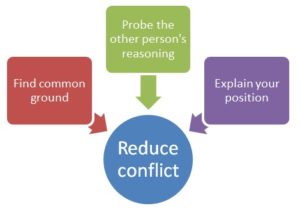Difficult negotiations don’t have to be impossible ones.
Deal with even the most challenging negotiations by using these simple but effective verbal strategies.
Find common ground
No matter how polarised the views, you can usually find common ground. You just have to work out what it is. Ask questions such as ‘what do we agree on?’ or ‘what’s important to both of us?’ Establish areas of agreement early on. You’ll then find it easier to work through the sticking points.
Probe reasoning
You may totally disagree with the other person’s viewpoint. But hold back on your opinion. Instead, find out why the other person thinks differently. You show your willingness to listen. You’ll gain insights into the real problems, making it easier to find solutions.
Again, asking open questions is a great tactic. Ask ‘what are your reasons for believing that?’ or ‘how did you come to that conclusion?’ Avoid asking ‘why’ questions. You may come across as too direct and aggressive.
Explain your position
There may still be issues you can’t agree on. You might be after a very different solution from what’s on the table.
Explain your reasoning before saying what you want. Explain why you disagree with the other person. Consider opening with ‘these issues are important to me because …’ or ‘let me explain why I think differently’. If you go straight to what you want that’s all the other person will hear. The person will be too busy thinking of ways to disagree to listen to your explanation. Starting with your reasons increases your chances of being heard.

Need advice on what to say? Ask Eleanor now. Send your question and we’ll answer it in a future blog post.
Error: Contact form not found.
